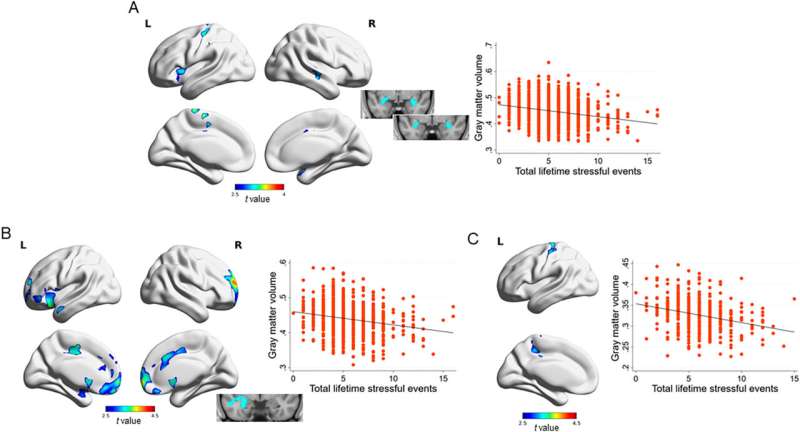This article has been reviewed according to Science X's editorial process and policies. Editors have highlighted the following attributes while ensuring the content's credibility:
fact-checked
peer-reviewed publication
trusted source
proofread
Stressful events in midlife might be a risk factor for Alzheimer's disease in older ages

Stressful experiences in midlife or during childhood may be associated with a higher risk of developing Alzheimer's disease and neuroinflammation, respectively. This is one of the conclusions of a study published in Annals of Neurology and led by the Barcelona Institute for Global Health (ISGlobal), a center supported by the "la Caixa" Foundation, in collaboration with the Barcelonaβeta Brain Research Center (BBRC), research center of the Pasqual Maragall Foundation.
Stressful Life Events are those in which objective external threats activate behavioral and psychological responses in us, for example, the death of a loved one, unemployment, or illness. Mounting evidence suggests that stress could be associated with an increased risk of dementia and cognitive decline.
The purpose of this research was to assess whether the accumulation of stressful life events throughout life could influence the development of Alzheimer's-related pathologies in older ages. To do so, the research team counted on 1,290 volunteers from the ALFA cohort in Barcelona, also supported by the "la Caixa" Foundation, all of them cognitively unimpaired at the time of the study but with a direct family history of Alzheimer's disease.
Participants went through interviews to assess the number of Stressful Life Events. Lumbar punctures and magnetic resonance imaging (MRI) were performed to test different biomarkers related to Alzheimer's disease.
Midlife as a vulnerable period
The statistical analyses revealed that the accumulation of stressful events during midlife was associated with higher levels of β-amyloid (Aβ) protein, a key player in the development of Alzheimer's disease.
"We know midlife is a period when Alzheimer's disease pathologies start to build up. It is possible that these years represent a vulnerable period where experiencing psychological stress may have a long-lasting impact on brain health," says Eleni Palpatzis, ISGlobal researcher and first author of the study.
The research team also found that higher levels of stressful experiences in childhood were associated with higher risk of developing neuroinflammation in older ages. Inflammation has been recognized as a key molecular response in neurodegenerative diseases, and these results are in line with emerging evidence suggesting childhood trauma to be linked with increased adulthood inflammation.
Sex differences on the impact of stressors
Accumulation of stressful life events over the course of life were associated with higher levels of β-amyloid (Aβ) protein only in men. In women, however, the researchers observed that more stressful experiences over the course of life were associated with lower volumes of gray matter, implying that stress may have sex-specific effects.
"Our results suggest that the mechanisms through which life stressors affect brain health in men and women are different: amyloid protein accumulation in men and brain atrophy in women," says Eider Arenaza-Urquijo, ISGlobal researcher and last author of the study.
Lastly, the authors found that stressful life events in people with a history of psychiatric disease were associated with higher levels of Aβ and tau proteins, neuroinflammation, and lower gray matter volume, suggesting that this population could be more susceptible to the effects of stressful life events, for example, due to impaired stress-coping abilities which could make them more vulnerable.
"Our study reinforces the idea that stress could play a significant role in the development of Alzheimer's disease and provides initial evidence regarding the mechanisms behind this effect, but additional research is needed to replicate and validate our initial findings," says Eider Arenaza-Urquijo.
More information: Eleni Palpatzis et al, Lifetime Stressful Events Associated with Alzheimer's Pathologies, Neuroinflammation and Brain Structure in a Risk Enriched Cohort, Annals of Neurology (2024). DOI: 10.1002/ana.26881





















